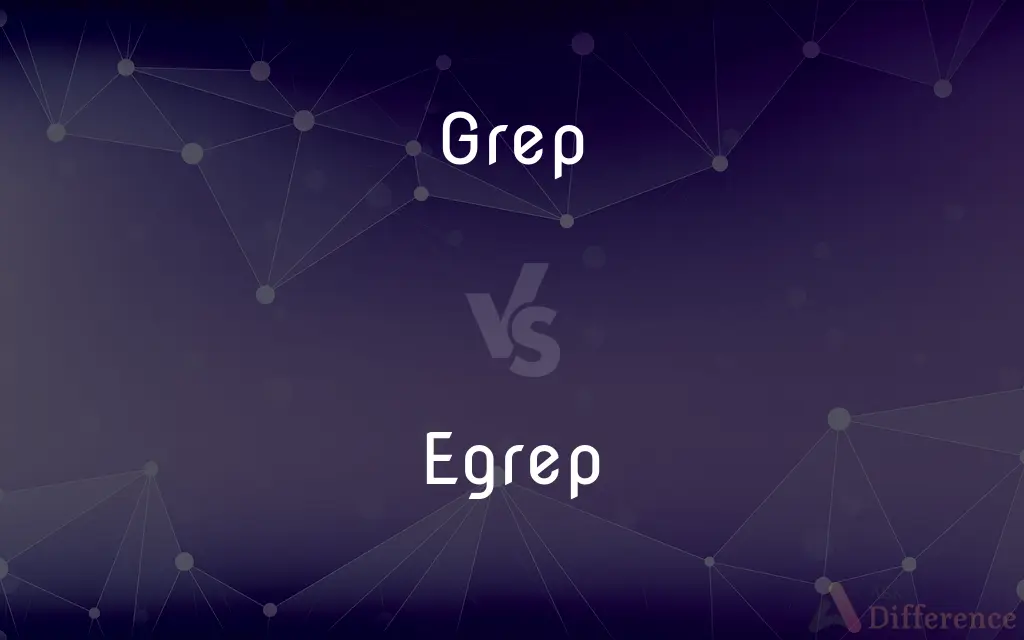Grep vs. Egrep — What's the Difference?
By Tayyaba Rehman — Published on December 1, 2023
Grep is a command-line utility for searching plain-text using patterns, while Egrep (extended grep) supports extended regular expressions with enhanced pattern-matching capabilities.

Difference Between Grep and Egrep
Table of Contents
ADVERTISEMENT
Key Differences
Grep, stemming from "global regular expression print," is a powerful command-line tool used for searching specific patterns within files. It allows users to find lines in a text file that match a certain pattern. On the other hand, Egrep, or "extended grep," is a variation of grep that supports extended regular expressions (EREs). This means it can understand more complex patterns compared to basic regular expressions used by grep.
In using Grep, the user often deals with basic regular expressions. These include characters, dots, and asterisks, among others. Egrep, conversely, accepts the full range of regular expressions, making it more versatile for intricate search patterns. This might include patterns with alternations, groups, and other extended functionalities.
One might consider Egrep as a more advanced version of Grep due to its extended capabilities. Still, it's essential to recognize that they serve similar foundational purposes — searching text based on patterns. However, the distinctions in their abilities, mainly Egrep's support for extended regular expressions, set them apart.
It's also worth noting that in some modern systems, the distinction between Grep and Egrep has blurred. This is because the '-E' flag in Grep can enable the same extended regular expression capabilities found in Egrep. Nevertheless, knowing the core differences between the two remains beneficial for users who encounter older systems or need a clear understanding of their tools.
Comparison Chart
Regular Expression
Basic regular expressions (BRE).
Extended regular expressions (ERE).
ADVERTISEMENT
Capabilities
Limited pattern-matching features.
Enhanced pattern-matching with alternations, etc.
Common Usage
Simple pattern searches in files.
Complex pattern searches in files.
Command Flag
Typically used without a flag for basic patterns.
Often used with the '-E' flag in modern systems.
Origins
Original text search tool in Unix-like systems.
Variation of grep for advanced pattern matching.
Compare with Definitions
Grep
A command-line tool for searching text patterns.
Using grep, I found all lines containing the word apple.
Egrep
Exists as a variation for advanced pattern matching.
When basic grep wasn't enough, I switched to egrep for more features.
Grep
Utilizes basic regular expressions for pattern matching.
I used grep to search for the exact phrase red ball.
Egrep
An extended version of grep for complex patterns.
Egrep helped me find lines that had either apple or orange.
Grep
Often used for simple search tasks in files.
I utilized grep to quickly identify error messages in the log.
Egrep
Provides more intricate search capabilities than grep.
Egrep was crucial for my detailed text analysis tasks.
Grep
Originates from Unix-like operating systems.
Grep has been a staple in Unix systems for decades.
Egrep
Supports characters like '?', '+', and '|'.
Using egrep, I found lines with one or more occurrences of apple.
Grep
Can be combined with other commands via pipes.
I piped the output of another command to grep to filter results.
Egrep
Uses extended regular expressions for searching.
With egrep, I searched for patterns with alternations and grouping.
Grep
A program which selects lines in a file which match a given pattern.
Grep
(computing) To use a program such as grep to search in a file.
You can't grep dead trees.
Grep
(by extension) To search anything (perhaps a paper document by eye).
Common Curiosities
Is egrep available on all systems?
While common on Unix-like systems, its availability depends on the specific OS and its configurations.
Is egrep always better than grep?
Not always. While egrep has advanced features, grep is sufficient for basic searches.
Can grep handle extended regular expressions?
Using the '-E' flag, grep can mimic the behavior of egrep.
What is the primary function of grep?
Grep is used to search for specific patterns within text files.
Can egrep interpret basic regular expressions?
Yes, egrep understands both basic and extended regular expressions.
Are there modern alternatives to grep and egrep?
While they remain popular, tools like "ag" (The Silver Searcher) and "ripgrep" offer advanced features and speed.
How does egrep differ from grep?
Egrep supports extended regular expressions, allowing for more complex pattern searches.
Which should I use for simple text searches?
For straightforward tasks, grep is typically sufficient.
Are grep and egrep case-sensitive?
By default, yes. But using the '-i' flag makes the search case-insensitive.
Can grep and egrep handle large files?
They can handle large files, but performance might vary depending on the system and file size.
Why would someone prefer grep over egrep?
Simplicity and habit. For basic searches, grep is straightforward and often what many learned first.
What's the origin of the name "grep"?
It stands for "global regular expression print."
Are there other variations of grep?
Yes, like fgrep (fixed grep), which searches for fixed strings without regex.
How can I search across multiple files?
Both grep and egrep allow pattern searching across multiple files by specifying them.
Do grep and egrep only work with text files?
They're designed for text files, but with the right flags, they can read binary files, albeit with limitations.
Share Your Discovery

Previous Comparison
Sneakers vs. Tennis Shoes
Next Comparison
Pulsar 220 DTSI vs. Pulsar 220 DTS-FIAuthor Spotlight
Written by
Tayyaba RehmanTayyaba Rehman is a distinguished writer, currently serving as a primary contributor to askdifference.com. As a researcher in semantics and etymology, Tayyaba's passion for the complexity of languages and their distinctions has found a perfect home on the platform. Tayyaba delves into the intricacies of language, distinguishing between commonly confused words and phrases, thereby providing clarity for readers worldwide.












































